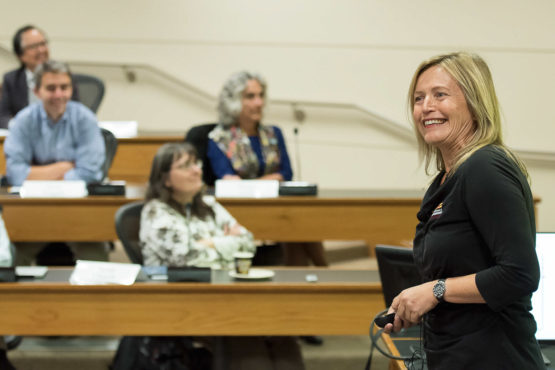Stanford’s Task Force on Women in Leadership recommends ways to improve the leadership climate on campus

Margot Gerritsen, chair of the Task Force on Women in Leadership, speaking to the Faculty Senate on Thursday. (Image credit: L.A. Cicero)
To help move Stanford toward fully inclusive leadership, the university should provide training, networking opportunities and mentorship for aspiring as well as newly appointed leaders, according to a new report by the Task Force on Women in Leadership.
Those were some of the recommendations in the 100-page report, which was distributed to faculty over the summer and discussed at the Oct. 13 Faculty Senate meeting. The senate presentation and discussion will be available soon on the senate’s website.
Speaking to the senate, Margot Gerritsen, chair of the task force and an associate professor of energy resources engineering, said many of the recommendations focus on male as well as female faculty members.
“Ultimately, we want to build an inclusive, supportive, inspiring environment for all our leaders, not just for women,” she said. “We really want to be the best we can be in inclusive leadership.”
The task force, which was convened by Provost John Etchemendy in 2014, conducted more than 50 interviews with current and former leaders, and held five open workshops. The 10-member task force included faculty from all seven schools.
“What we learned about challenges and barriers to women in leadership on campus in these conversations is mostly consistent with published research,” the report said.
“In that sense, Stanford is not unique among its peers. But, we also found strong enthusiasm among current leaders to effect change, and to help build a more inclusive and supportive environment for current and future leaders. Stanford is in a position, with commitment and support, to be a leader on inclusive leadership.”
The task force divided its recommendations into five broad goals:
- Reduce barriers to attaining leadership
- Nurture individuals with leadership potential, with particular attention to inclusiveness
- Strengthen processes for inclusiveness in the selection of leaders
- Promote the success of current leaders at all levels
- Ensure institutional commitment to inclusive leadership through accountability and regular reporting
While the report included 15 recommendations, Gerritsen emphasized that they are not prescriptive, but should be considered a template for future planning. There are significant differences in leadership cultures in the schools, she said, and all of the barriers do not exist in all of the schools.
“We also need faculty to be engaged in finding the most effective approaches,” she said.
To help reduce barriers, the task force recommended that Stanford provide sufficient and equitable resources to reduce the professional and personal opportunity cost of assuming a leadership role, with particular attention to work-life balance concerns.
“These resources may encompass financial support to preserve time devoted to academic goals, funding to attend leadership training programs, or additional university programs that provide childcare, elder care, transportation, home care or other services that are attuned to the special challenges encountered by individuals in leadership roles,” the report said.
To help nurture aspiring leaders, the task force suggested that Stanford enhance awareness of pathways and strategies toward leadership positions.
To strengthen the processes for inclusiveness in the selection of leaders, the task force encouraged Stanford to improve the transparency around the identification, recruitment and selection of leaders.
“We recommend that training programs include courses in critical skills, such as facilitating meetings, conducting difficult conversations, negotiating and active listening, and also that trainees receive exposure to a variety of leadership styles and approaches,” the report said.
To help promote the success of newly appointed leaders, the task force recommended that Stanford establish a new orientation program for them and provide sufficient funding to enable new leaders to be effective and creative in their new posts.
“Staffing needs should also be evaluated to ensure the new leader has the logistical and administrative help to achieve the goals that motivated her to seek the new position,” the report said.
To help ensure accountability, the task force recommended that Stanford identify, track and report metrics for assessing inclusive representation in leadership.
